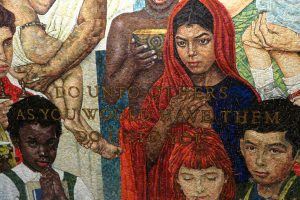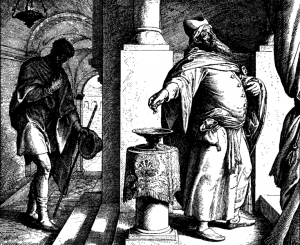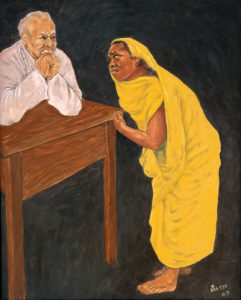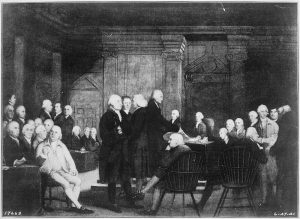====================
A homily offered by the Rev. Dr. C. Eric Funston on Friday, November 18, 2016, to the people of St. Timothy’s Episcopal Church, Massillon, Ohio, at the Celebration of New Ministry (Installation) of the Rev. George Baum as their rector.
(The lessons for the service were Joshua 1:7-9; Psalm 134; Ephesians 4:7,11-16; and St. John 15:9-16)
====================
 Good evening! For those who don’t know me, I am Eric Funston, a priest of the Episcopal Church and rector of St. Paul’s Parish in Medina, Ohio. For those of you who don’t know why I’m preaching here tonight . . . I wish I could tell you! Usually these ordination or installation homily gigs go to someone with whom the new clergy person has had a, shall we say, formative relationship: a former pastor, a seminary professor or a ministry supervisor, an elder minister under whom the new pastor served a curacy, someone responsible for the priestly formation of the new rector. But that doesn’t describe me . . . I am not responsible for George Baum ~ and that is very probably a good thing!
Good evening! For those who don’t know me, I am Eric Funston, a priest of the Episcopal Church and rector of St. Paul’s Parish in Medina, Ohio. For those of you who don’t know why I’m preaching here tonight . . . I wish I could tell you! Usually these ordination or installation homily gigs go to someone with whom the new clergy person has had a, shall we say, formative relationship: a former pastor, a seminary professor or a ministry supervisor, an elder minister under whom the new pastor served a curacy, someone responsible for the priestly formation of the new rector. But that doesn’t describe me . . . I am not responsible for George Baum ~ and that is very probably a good thing!
Seriously, I’m here simply because George and I are friends and colleagues, and he asked me to preach, which I am honored and pleased to do.
An ecumenical friend of mine was asked to do the same, to preach at the installation of a new pastor of his denomination with whom he had not had a mentor relationship, so he sent the soon-to-be-plugged-in clergyman an email asking what sort of church he hoped he’d be joining. The answer was, “I would love to come into a church that was unified, where everyone loved each other, and they all prayed for the pastor.” When my friend shared that reply with our ministerial alliance, we all started laughing. Not because it’s funny, but because it’s so universally true. Every pastor would love to have a parish characterized by unity, love, and prayer.
I didn’t ask George what he might be looking for in a new pastoral call, nor what he might be hoping for from this installation sermon; frankly, I was sort of afraid to do so! Besides, when I even hinted at what I might say tonight he started to (and I quote from his Facebook page) “make a few phone calls for backup preachers.” Nonetheless, I suspect that if I had asked him, he might have said pretty much the same thing, that he would love to have St. Timothy’s Parish be a church that is unified, where everyone loves one another, and where the members pray for the rector.
So, about that first item, unity:
George selected a well-known passage from St. Paul’s letter to the church in Ephesus as our Epistle Lesson tonight. In the three verses which come before the opening sentence of our reading, St. Paul wrote these words which, I think, will also be very familiar to all of you:
There is one body and one Spirit, just as you were called to the one hope of your calling, one Lord, one faith, one baptism, one God and Father of all, who is above all and through all and in all. (Eph 4:4-6)
These verses summarize the primary focus of the letter to the Ephesians, which is the church’s call to unity. The letter stresses that members of the church are to make “every effort to maintain the unity of the Spirit in the bond of peace.” (4:3) After making this appeal, Paul launches, as we heard, into a celebration of the church’s diversity: some members are apostles, some are prophets, some are evangelists, some are pastors, some are teachers, and so on. He has done this before, as when he reminded the Corinthians that
there are varieties of gifts, but the same Spirit; and there are varieties of services, but the same Lord; and there are varieties of activities, but it is the same God who activates all of them in everyone. (1 Cor 12:4-6)
Or when he wrote to the Galatians that though they might have been Jew or Greek, slave or free, male or female, those differences no longer mattered “for all of you are one in Christ Jesus.” (Gal 3:28) Whatever and whoever we are, we are all given gifts to equip the saints for ministry “until all of us come to the unity of the faith and of the knowledge of the Son of God, to maturity, to the measure of the full stature of Christ.” (Eph 4:13). Paul’s call in this letter is for unity not uniformity, for a unity which embraces and celebrates diversity so that, in the words of our Lord’s prayer to his Father:
. . . [all] may be one, as we are one, I in them and you in me, that they may become completely one, so that the world may know that you have sent me and have loved them even as you have loved me. (Jn 17:22-23)
More than a half-century ago, when I was in junior high school, I saw a made-for-television movie which portrayed the most outrageous future you could imagine, a future in which every home had in it a computer terminal on which the family could talk to their friends and co-workers, could order their groceries, and could even cast their votes. In this impossible-to-imagine future, every citizen would enjoy instant coverage of world news, direct contact with political leaders, immediate access to all sorts of data, and be well-informed. This, of course, would lead to political unity and world peace. Oh … and everyone would have flying cars.
I’m still waiting for that future. We have the computers in our homes but not much else. Perhaps all the rest will come along when the flying cars get here. In the meantime, what our 24/7 instantaneous news cycle and our direct access to data (both true and false) have done is exacerbate our differences. Instead of drawing us closer together, the internet seems to have pushed us apart into competing “bubbles” and “echo chambers.” If the recently concluded election cycle, its outcome, and reactions to that result teach us anything, it is that the church’s witness to unity in diversity is needed now more than ever. And it is within this wider context of division and conflict that this community, St. Timothy’s Episcopal Church of Massillon, Ohio, has called the Rev. George Baum to be its rector.
Now, let’s be honest, the church has not always been a paragon of unity, despite Jesus’ prayer and St. Paul’s admonitions. There have always been divisions and differences of opinion within the church; there have always been black and white and several shades of grey and many colors in between; there have always been yesses and there have always been noes; there have always been those who want to push forward and those who want to hold back. But on a recent episode of the NPR show On Being Muslim American social scholar Eboo Patel argued that religious communities must stand together and witness to what he called “diversities of justice.” In this, he echoes the call of Anglican theologian David F. Ford, who has called upon our churches, within themselves and in outreach to others, to form what he labels “improved partnerships of disagreement.” Only if we ourselves are in unity of faith measuring up to the full stature of Christ can we make that witness to the world.
You have called George to be your rector which means that, among other things, you have called him to be a prophet, to be your parish’s and the wider church’s and God’s spokesman to the community around you. In a few minutes, your wardens will present him a set of keys and encourage him to open the doors of this place to all people; shortly after that, George will kneel in the center of the nave and pray for God’s blessing that through his ministry and yours “all the world may be drawn into [God’s] blessed kingdom.” Regardless of where a rector may personally stand on any of the economic, political, demographic, or social spectra of difference and disagreement which encourage us to division and conflict, he or she is called to represent your unity in and to the wider world.
Don’t get me wrong, disagreements are fine and leaders in the church should welcome lively discussion of issues because no one person has a monopoly on all wisdom. Disagreement and debate help church leaders to hear all sides of the issues and force them to think matters through. But when all is said and done, when all the disagreements have been aired, and all the points debated, the church community will still be here and it must be united in faith and growing into the full stature of Christ.
The only way we can do that is with the second element of the new pastor’s request, love:
“This is my commandment,” said Jesus, “that you love one another as I have loved you.” (Jn 15:12)
We all know that no matter what may be happening in the larger world, no matter what disagreements or conflicts we may get into in business, or politics, or the church, babies still get born, children still grow up, teens and young adults still go through the changes and passages of life, young men and women still get married . . . and older people do too! People still get sick and people still die . . . and, George, these fine people here have invited you to be their pastor, guide, companion, and counselor to share all of that with them. No matter where they or you may stand on those many spectra of opinion, demographics, politics, or economics, they are going to invite you into some of the most intimate and sacred moments of their lives.
And it is in those intimate and sacred moments that the reality of our unity in Christ is made most clear. Connections, sacramental connections are made between people at different points on those various spectra; a web of relationship comes into being and fosters and upholds the work to which we all are called. That web is elastic but tough; it is flexible and enduring; it is stronger than any of those one-dimensional spectra could ever be. We give that web the name of “love.”
Good people of St. Timothy’s Parish, please remember that George does not do this ministry alone! Tending to this web of relationship we call “love” is everyone’s job. As St. Paul continues in his letter to the church in Ephesus, while some are given the charism of being pastors and teachers, to “each [and every one] of us [grace is given] according to the measure of Christ’s gift . . . to equip the saints for the work of ministry, for building up the body of Christ.”
Love is the glue that bonds the church in unity. Love for Christ and love for each other. In St. Paul’s letter to the Colossians, he writes that he hopes his readers’ hearts will “be encouraged and united in love.” (Col 2:2) The Greek word translated as “united” is sumbibazo. It’s the same verb Paul uses in our Ephesians text this evening, translated here as “joined together,” the way the ligaments and tendons hold the joints of the body together and promote its growth, “building itself up in love.” (Eph 4:16) Remember that love is never an emotion; it is always an action. Love is not something we feel; love is something we do.
Love is patient; love is kind; love is not envious or boastful or arrogant or rude. It does not insist on its own way; it is not irritable or resentful; it does not rejoice in wrongdoing, but rejoices in the truth. It bears all things, believes all things, hopes all things, endures all things. Love never ends. (1 Cor 13:4-8a)
So love each other and love your new rector. As our bishop is fond of saying, “Love God. Love your neighbor. Change the world.”
One of my favorite hymns includes the repeated refrain, “God is love and where true love is, God himself is there.” So, George, remember those words of God to Joshua, “Be strong and courageous; do not be frightened or dismayed, for the Lord your God is with you wherever you go.” Or, as St. Paul wrote to the young bishop Timothy for whom this parish is named, “God [does] not give us a spirit of cowardice, but rather a spirit of power and of love and of self-discipline.” (2 Tim 1:7)
Which brings us, finally, to the third request of the new pastor, to the discipline of prayer.
“You that stand by night in the house of the Lord, lift up your hands and bless the Lord.” (Cf. Ps 134) The Psalmist’s fancy way to say, “Pray!” What more can be said? What more needs to be said? Not much, really . . . but I’m a preacher so it’s my job say what shouldn’t need to be said. Tonight, let’s say it. “Pray!”
Prayer is the putting into action of the love that binds our unity. Let me say that again: Prayer is the putting into action of the love that binds our unity.
It’s easy, I’m sure you’ll all agree, to pray for those we like, for those with whom we agree. It’s also pretty easy to pray for people we don’t know; our formal in-church prayer often include prayers for foreign provinces of the Anglican Communion – this Sunday, for example, we are asked to pray for church members in the Falkland Islands and for their bishop William Nigel Stock. I don’t know Bishop Stock or anyone else in the Falklands so I’m perfectly happy to pray for them until the cows come home!
It should be easy to pray for members of our family and of our church, and for our friends, although sometimes we may not like them very much and often we may not agree with them, and that makes it a little harder. And then there are those other people, the ones we really don’t like or with whom on a scale of 1-to-10 we disagree at level 12; for me, I confess, it’s practically impossible to pray for them. But Someone once said, “Love your enemies, do good to those who hate you, bless those who curse you, [and] pray for those who abuse you.” (Lk 6:27-28)
In my counseling with people who are dealing with anger issues, I often suggest to them that they should pray by name for the one with whom they are angry. In every parish I have served, I have insisted that we pray for the president, by name, at every Sunday service: I have had parishioners who refused to pray for Bill Clinton; I have had parishioners who refused to pray for George Bush; I have had parishioners who refused to pray for Barack Obama; and I know I will have parishioners who will refuse to pray for Donald Trump. Nonetheless, I will insist that we do so because, as Paul wrote to Timothy, “I urge that supplications, prayers, intercessions, and thanksgivings be made for everyone, for kings and all who are in high positions, so that we may lead a quiet and peaceable life in all godliness and dignity.” (1 Tim 2:1-2)
Note what Paul says there. He urges prayer for our leaders not so that they, the ones being prayed for, will be successful, but rather so that we, the ones who are praying, may have the blessings of quiet, peace, godliness, and dignity. Prayer works on the heart of the one who prays. One of the chief purposes of prayer is to transform the heart of the person praying so that it more closely resembles the heart of God. Prayer nourishes us and aligns our wills with God’s will. In this way, prayer heals and strengthens our relationships with the ones for whom we pray.
To be sure, we also believe that prayer benefits the subject of our prayers, as well. Prayer, as an offering of humble dependence, strengthens all within the community which finds its source and harmony in God. Prayer is the putting into action of the love that binds our unity.
In every epistle, Paul begs his churches to pray for him. It is the constant need of every pastor, to feel supported by the prayers of his or her people. So, please, pray for George (even when he disappoints – which he will, occasionally; even when you disagree with him – which you will, occasionally); pray for his family; pray for one another; and pray for the community and the world within which together you begin this new ministry.
So there you have it. The three things every priest wishes to find in his or her parish: unity, love, and prayer. With these as foundation, together with your new rector, you can faithfully respond to Jesus, who says to you, just as surely as he said to his first disciples, “You did not choose me but I chose you. …. Go and bear fruit that will last.”
It is common at the end of these sorts of homilies to give a specific charge to the person whose new ministry is being celebrated so, George, I invite you to stand . . . and every member of St. Timothy’s Parish, I invite you to stand, also . . . I can offer all of you no better charge than that given by the Patron Saint of my parish to the Patron Saint of your parish:
Pursue righteousness, godliness, faith, love, endurance, [and] gentleness. Fight the good fight of the faith; take hold of eternal life . . . keep the commandment without spot or blame . . . [and] guard what has been entrusted to you. (1 Tim 6:11-12,14,20)
Do so in unity, with love, holding each other in prayer. Because despite what I said in the jest at the beginning of this sermon, I am responsible for George Baum. We are all responsible to and for one another. So, again, live and minister in unity and with love, and pray for one another.
Amen.
====================
Father Funston is the rector of St. Paul’s Episcopal Church, Medina, Ohio.
 It’s the last Sunday of the Christian year, sort of a New Year’s Eve for the church. We call it “the Feast of Christ the King” and we celebrate it by remembering his enthronement. As Pope Francis reminded the faithful in his Palm Sunday homily a few years ago, “It is precisely here that his kingship shines forth in godly fashion: his royal throne is the wood of the Cross!” (Francis)
It’s the last Sunday of the Christian year, sort of a New Year’s Eve for the church. We call it “the Feast of Christ the King” and we celebrate it by remembering his enthronement. As Pope Francis reminded the faithful in his Palm Sunday homily a few years ago, “It is precisely here that his kingship shines forth in godly fashion: his royal throne is the wood of the Cross!” (Francis)  Good evening! For those who don’t know me, I am Eric Funston, a priest of the Episcopal Church and rector of St. Paul’s Parish in Medina, Ohio. For those of you who don’t know why I’m preaching here tonight . . . I wish I could tell you! Usually these ordination or installation homily gigs go to someone with whom the new clergy person has had a, shall we say, formative relationship: a former pastor, a seminary professor or a ministry supervisor, an elder minister under whom the new pastor served a curacy, someone responsible for the priestly formation of the new rector. But that doesn’t describe me . . . I am not responsible for George Baum ~ and that is very probably a good thing!
Good evening! For those who don’t know me, I am Eric Funston, a priest of the Episcopal Church and rector of St. Paul’s Parish in Medina, Ohio. For those of you who don’t know why I’m preaching here tonight . . . I wish I could tell you! Usually these ordination or installation homily gigs go to someone with whom the new clergy person has had a, shall we say, formative relationship: a former pastor, a seminary professor or a ministry supervisor, an elder minister under whom the new pastor served a curacy, someone responsible for the priestly formation of the new rector. But that doesn’t describe me . . . I am not responsible for George Baum ~ and that is very probably a good thing!  Tuesday was the Feast of All Saints (which we are commemorating today, as is permitted by tradition, by translating the feast to the following Sunday). Traditionally, All Saints Day (or All Saints Sunday) commemorates the departed members of the Christian church who are believed to have attained heaven (it is not limited to those officially canonized by a church hierarchy).
Tuesday was the Feast of All Saints (which we are commemorating today, as is permitted by tradition, by translating the feast to the following Sunday). Traditionally, All Saints Day (or All Saints Sunday) commemorates the departed members of the Christian church who are believed to have attained heaven (it is not limited to those officially canonized by a church hierarchy).  For the past couple of weeks in the Daily Office lectionary and today in the Sunday lectionary we are reading from the Wisdom of Yeshua ben Sira, some times called Sirach, sometimes called Ecclesiasticus, one of the books of the Apocrypha, those books recognized by the Roman and Eastern Orthodox churches as canonical, but rejected by Protestants. Anglicans steer a middle course and accept them for moral teaching, but not as the basis for religious doctrine. The text is a late example of what is called “wisdom literature,” instruction in ethics and proper social behavior for young men, especially those likely to take a role in governance.
For the past couple of weeks in the Daily Office lectionary and today in the Sunday lectionary we are reading from the Wisdom of Yeshua ben Sira, some times called Sirach, sometimes called Ecclesiasticus, one of the books of the Apocrypha, those books recognized by the Roman and Eastern Orthodox churches as canonical, but rejected by Protestants. Anglicans steer a middle course and accept them for moral teaching, but not as the basis for religious doctrine. The text is a late example of what is called “wisdom literature,” instruction in ethics and proper social behavior for young men, especially those likely to take a role in governance. The story of the “unjust judge” has to be one of the most confusing of Jesus’ parables related in any of the Gospels. In every bible study group I have ever been a part of someone will want to know how the “unjust judge” could possibly represent God . . . .
The story of the “unjust judge” has to be one of the most confusing of Jesus’ parables related in any of the Gospels. In every bible study group I have ever been a part of someone will want to know how the “unjust judge” could possibly represent God . . . . ![Dives and Lazarus. Psalter (Munich Golden Psalter). England [Gloucester?], 1st quarter of the 13th century.](http://thefunstons.com/wp-content/uploads/2016/09/Lazarus-and-Dives-300x264.jpg) We could, I suppose, spiritualize the story of Lazarus and the rich man. We could, but if we did we would be twisting it out of shape. This is not a spiritual story. This is a bare-knuckled street-brawl of a story about wealth, about money and possessions, about someone who had plenty and about someone who had none. If we are going to honor the biblical text, we cannot spiritualize this tale; we have to deal with it as it is given us, as a story about money.
We could, I suppose, spiritualize the story of Lazarus and the rich man. We could, but if we did we would be twisting it out of shape. This is not a spiritual story. This is a bare-knuckled street-brawl of a story about wealth, about money and possessions, about someone who had plenty and about someone who had none. If we are going to honor the biblical text, we cannot spiritualize this tale; we have to deal with it as it is given us, as a story about money. I’d like you all to take your Prayer Books in hand and turn with me to page 855 which is way in the back of the book in the section called The Catechism or Outline of the Faith. At the top of the page are three questions about the mission of the church and the answers to those questions that we as Episcopalians teach. I’m going to read the questions; I’d like you to read the answers:
I’d like you all to take your Prayer Books in hand and turn with me to page 855 which is way in the back of the book in the section called The Catechism or Outline of the Faith. At the top of the page are three questions about the mission of the church and the answers to those questions that we as Episcopalians teach. I’m going to read the questions; I’d like you to read the answers: Some translations of the Bible like to add to it. They insert explanatory headings and titles into the teachings of the authors of scripture or before the parables or important elements in Jesus’ life and teachings. The New International Version, for example, adds the title “The Parable of the Rich Fool” to our gospel text for today. It breaks up our reading from Ecclesiastes with three such headings: “Everything Is Meaningless,” “Wisdom Is Meaningless,” and “Toil Is Meaningless.” If you have a bible like that, take those titles and subheadings with a very large grain of salt because they are simply not accurate!
Some translations of the Bible like to add to it. They insert explanatory headings and titles into the teachings of the authors of scripture or before the parables or important elements in Jesus’ life and teachings. The New International Version, for example, adds the title “The Parable of the Rich Fool” to our gospel text for today. It breaks up our reading from Ecclesiastes with three such headings: “Everything Is Meaningless,” “Wisdom Is Meaningless,” and “Toil Is Meaningless.” If you have a bible like that, take those titles and subheadings with a very large grain of salt because they are simply not accurate! When I was practicing law and serving as the chief legal officer of the Episcopal Diocese of Nevada, there was a church member (of another congregation than mine) who always greeted me with a lawyer story. “What’s the difference between a lawyer and ….? ” “There was a lawyer who went to heaven ….” I think I’ve heard all the lawyer jokes, and I considered starting with one this morning. If I had had more than a passing acquaintance with Jim McKee, I might have done so. But I didn’t know Jim, so I won’t do that. Instead, I’ll begin with some poetry.
When I was practicing law and serving as the chief legal officer of the Episcopal Diocese of Nevada, there was a church member (of another congregation than mine) who always greeted me with a lawyer story. “What’s the difference between a lawyer and ….? ” “There was a lawyer who went to heaven ….” I think I’ve heard all the lawyer jokes, and I considered starting with one this morning. If I had had more than a passing acquaintance with Jim McKee, I might have done so. But I didn’t know Jim, so I won’t do that. Instead, I’ll begin with some poetry. Last Monday, we celebrated our country’s 240th birthday in a way that is quite different from other celebrations of what we might call “national identity days” around the world.
Last Monday, we celebrated our country’s 240th birthday in a way that is quite different from other celebrations of what we might call “national identity days” around the world. 

